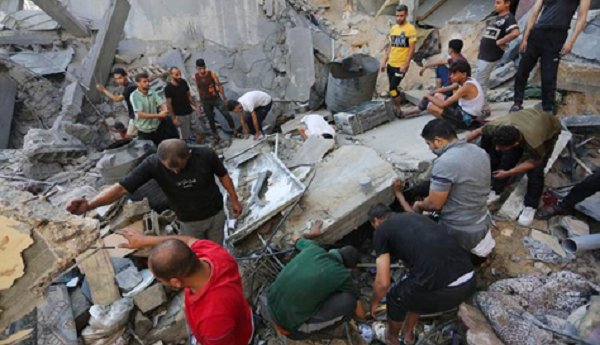Families of hostages approach the international court to seek the arrest of Hamas leaders
Former captives and relatives of hostages held since the Oct. 7 attack by Hamas in southern Israel are visiting the International Criminal Court on Wednesday to urge prosecutors to charge and seek the arrest of leaders of the militant group.
The visit is the latest step in efforts by Israelis to seek justice for victims of the attacks, in which about 1,200 people, mostly civilians, were killed and about 250 were taken hostage.
It comes a day after officials said that negotiations between Israel and Hamas are making progress toward another ceasefire and hostage release deal.
The group organizing Wednesday’s visit, The Hostages and Missing Families Forum, said in a statement that the complaint it is filing “encompass taking hostages, enforced disappearance, crimes of sexual violence, torture, and more severe allegations.”
ICC Prosecutor Karim Khan is already investigating alleged crimes committed by both sides in the conflict. On Monday, he said in a statement that he was “deeply concerned by the reported bombardment and potential ground incursion by Israeli forces in Rafah.”
Khan said his probe “is being taken forward as a matter of the utmost urgency, with a view to bringing to justice those responsible” for crimes falling under the court’s founding treaty, the Rome Statute.
He also called for “the immediate release of all hostages. This also represents an important focus of our investigations.”
Among those visiting The Hague was Ofri Bibas, sister of the hostage Yarden Bibas. Before boarding a plane to the Netherlands, she pleaded with the international community to take action, adding “the time has come for justice to be served.”
Yarden Bibas, his wife, Shiri, and sons, 4-year-old Ariel and baby Kfir, were kidnapped on Oct. 7.
Kfir Bibas is the youngest hostage held by Hamas, and was just 9 months old when he was kidnapped. Last month, his family members held several events to mark what they called “the saddest birthday in the world.”
“Close your eyes for a moment and try to imagine: a mother, wrapping her children and herself in a blanket, trying to grasp them close to her body, she’s the only thing protecting these two children, who are terrified as guns are pointed at them,” Ofri Bibas said before leaving for The Hague.
Since video emerged shortly after the attack showing the red-headed brothers swaddled in a blanket around their petrified mother, the infant with the toothless smile has become a symbol across Israel for the helplessness and anger over the 134 hostages still in captivity in Gaza.
The International Criminal Court seeks to bring individuals to justice, unlike the nearby International Court of Justice, or ICJ, which rules in disputes between nations.
The ICJ last month ordered Israel to do all it can to prevent death, destruction and any acts of genocide in Gaza, but the panel stopped short of ordering an end to the military offensive that has laid waste to the Palestinian enclave.
South Africa, which brought the case against Israel at the ICJ, on Tuesday lodged an “urgent request” with the court to consider whether Israel’s military operations targeting the southern Gaza city of Rafah are a breach of the provisional orders the court handed down last month in a case alleging genocide.
This article was first reported by The Canadian Press












